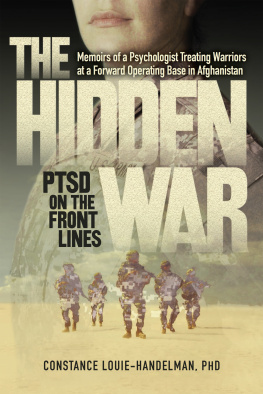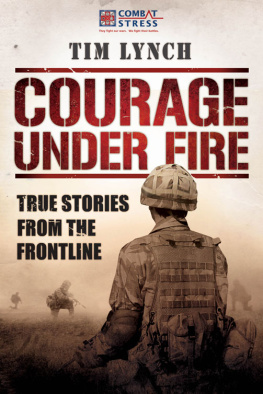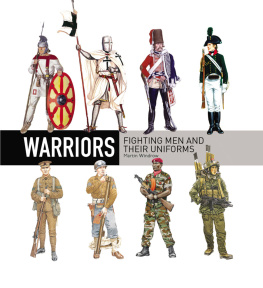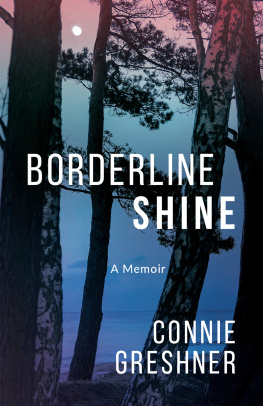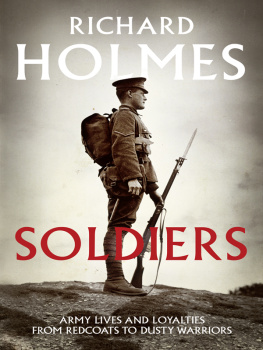
Energy Psychology Press
Fulton, CA 95439
www.EnergyPsychologyPress.com
Cataloging-in-Publication Data
Name: Louie-Handelman, Constance, PhD
Title: The Hidden War: Treating PTSD on the Front Lines Memoirs of a Psychologist Treating Warriors at a Forward Operating Base in Afghanistan / by Constance Louie-Handelman, PhD
Description: First editon. | Fulton, CA: Energy Psychology Press, 2018.
Identifiers: ISBN 978-1-60415-268-5 | ISBN 978-1-60415-269-2 (ebook)
Subjects: 1. Afghanistan War, 2001 Personal narrative, American. 2. Louie-Handelman, Constance. 3. Officers-United States-Biography. I. Title.
DS371.413.E87 2018
958.104/740973-dc23
2018 Constance Louie-Handelman, PhD
This book demonstrates an impressive personal improvement tool. It is not a substitute for training in psychology or psychotherapy. The author urges the reader to use these techniques under the supervision of a qualified therapist or physician. The author and publisher do not assume responsibility for how the reader chooses to apply the techniques herein. The ideas, procedures, and suggestions in this book are not intended as a substitute for consultation with your professional health care provider. If you have any questions about whether or not to use EFT, consult your physician or licensed mental health practitioner. The information in this book is of a general nature only, and may not be used to treat or diagnose any particular disease or any particular person. Reading this book does not constitute a professional relationship or professional advice or services. No endorsement or warranty is explicit or implied by any entity connected to this book, and there is no guarantee that you will have the same results.
All rights reserved. No part of this publication may be reproduced, stored in a retrieval system, or transmitted in any form or by any means, electronic, mechanical, photocopy, recording, or otherwise, without prior written permission from Energy Psychology Press, with the exception of short excerpts used with acknowledgment of publisher and author.
Cover design by Victoria Valentine
Editing by Stephanie Marohn Typesetting by Karin Kinsey
Typeset in ITC Galliard and Franklin Gothic Medium
First Edition Printed in USA by Bang Printing
10 9 8 7 6 5 4 3 2 1
Authors Note
The events and people in this book are real. However, to respect the privacy of all clients and certain individuals whose lives have touched mine, the names, ranks, and identifying details of the people mentioned in the book have been changed.
Although I kept a daily journal to move along the days, the many monotonous days, this book highlights certain events and counseling sessions while omitting others.
All photographs are courtesy of the author, except where noted.
This book is dedicated to all veterans who were willing to wear the uniform to bear the responsibility of our national defense.
Your service will never be forgotten.
Preventing war is much better than protesting against the war.
Protesting the war is too late.
Thich Nhat Hanh, Being Peace
The helicopter blades swirled the summers hot dusty air against my face. I climbed up the ramp and stepped inside the copter cabin. My rucksack, body armor, and weapon seemed heavier than ever. I dropped into the nearest seat, adjusted my helmet and rifle, and cinched my seat belt tight. At last, after 16 months of preparing for this day, I was flying over southern Afghanistan to my assigned forward operating base. Only minutes after taking off, the helicopters two door gunners were rapidly firing rounds from their machine guns. My breath caught in my throat. Glancing around uneasily at the edgy faces of the other passengers, I wondered if Id even get to fulfill the duty Id signed up forI could get killed before I had a chance to land in country!
Two years earlier, in 2009, I had read a disturbing article about the increasing number of suicides among active and reserve military personnel. The reported veteran suicide rate was 29.5 per 100,000, roughly 50% higher than the rate among the civilian population. The article said 22 veterans take their own lives each day. It cited possible reasons as two questionable wars, lengthy and multiple deployments, physical and mental injuries, depression, substance abuse, family stress, and financial strain. The article ended with a call for psychologists.
I discovered that the US Army Reserve was recruiting and had a program called the Officer Accession Pilot Program, which offered qualified medical professionals between the ages of 42 and 60 an initial appointment as an Army Medical Department officer, with a two-year military service obligation. At 56 years old, I was apprehensive, but I needed to follow my gut and my strong desire to help. I called and arranged an appointment with an army health care recruiter, and on March 5, 2009, I walked into her small office.
This was the beginning of a long application process that included a background check; lengthy questioning; verification of my education, training, and previous employment; character references; proof of my mothers citizenship; and, finally, a physical examination. I wrote the following as part of my application:
My motivation for serving with the United States Army Reserve Health Care Team is to provide vital mental health services to soldiers and their families. Learning about the Armys 2008 suicide rates, I was saddened by the distressing statistics. I would like to offer my 13 years of experience as a licensed clinical psychologist. I have worked in the community, a university counseling center, and hospitals as a member of a professional team assisting the seriously mentally ill, and with young adults adjusting to life challenges. I was also a clinical director with a staff of 30 overseeing the care of 600 outpatients. Lastly, as a former police officer, I understand the reluctance of people in uniform asking for help. I hope that this trend is changing and quality and compassionate care are available to those seeking it.
At this period of my life, I cannot think of anything I would rather do than to be a part of something as important as the Army Reserve Health Care Team: healing soldiers lives.
Being a member of the military is in my blood. I come from a family of Chinese-Americans who have a history of serving in the armed forces. My father, born and raised in San Francisco, volunteered and served as a gunners mate in the US Navy in the Pacific during WWII. My nephew, a Marine Corps reservist, was deployed to Iraq in 2009. As the first female in our family to join the military, I was continuing the trend. (A year later, my niece joined the US Army Reserve Dental Corps.)

Authors father circa 1942.

Niece, nephew, and author.
The army recruiter made it clear that there was a strong probability I would be deployed to Iraq or Afghanistan. I was excited about the idea, and yet there was a side of me that didnt want to deploy. Was I willing to risk my life? Could I endure the hardships of war? Could I do it at my age?
My husband, Rob, was supportive, although I think he quietly hoped that I wouldnt be selected. In 29 years of marriage, he had repeatedly witnessed my extremely independent nature and my determination and ambition in all things in life. When I set goals, I achieved them.
Next page
